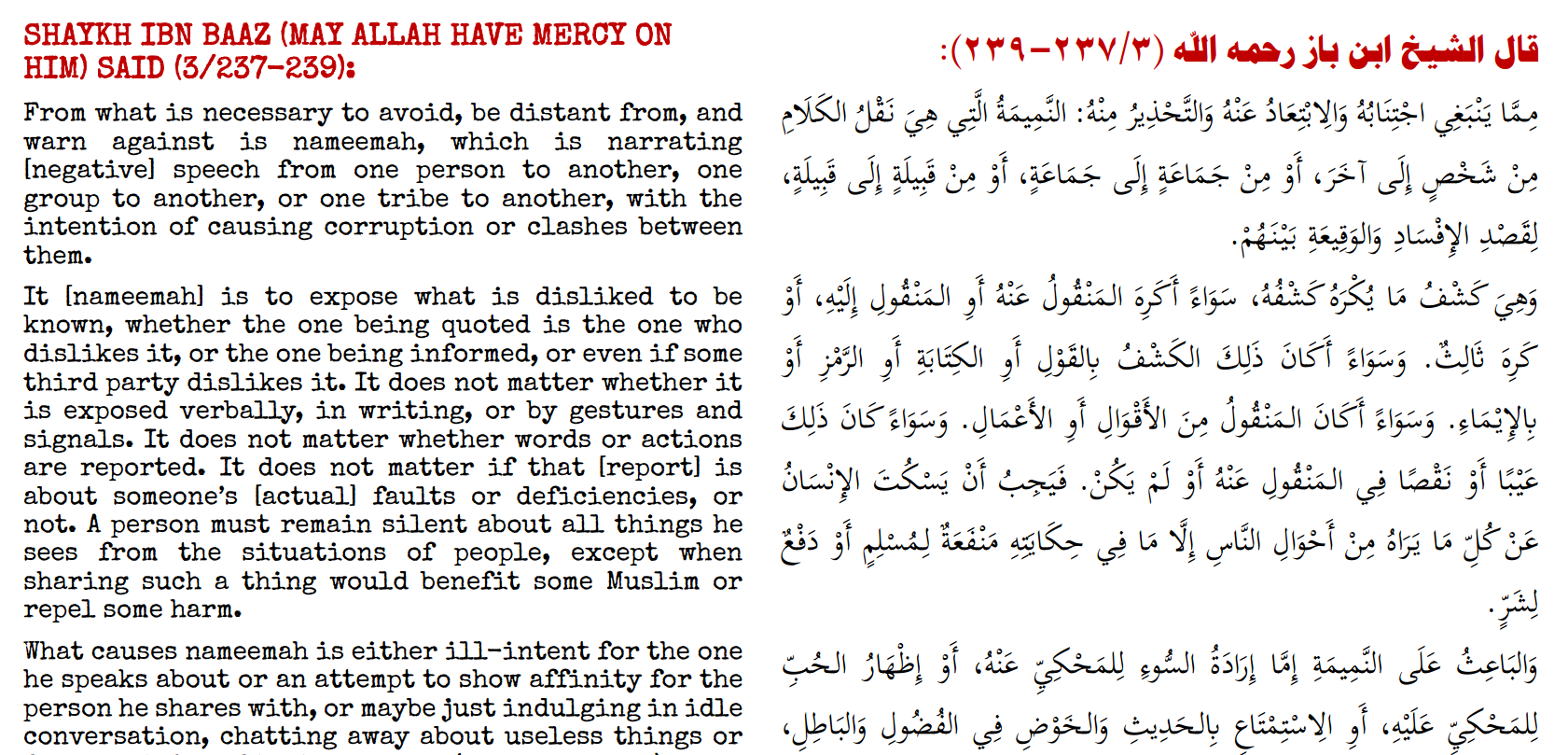In the Name of Allah, the Most Gracious, the Ever Merciful…
The great scholar, Shaykh ‘Abdul-‘Azeez ibn Baaz (may Allah have Mercy on him), stated:
From what is necessary to avoid, be distant from, and warn against is nameemah, which is narrating [negative] speech from one person to another, one group to another, or one tribe to another, with the intention of causing corruption or clashes between them.
It [nameemah] is to expose what is disliked to be known, whether the one being quoted is the one who dislikes it, or the one being informed, or even if some third party dislikes it. It does not matter whether it is exposed verbally, in writing, or by gestures and signals. It does not matter whether words or actions are reported. It does not matter if that [report] is about someone’s [actual] faults or deficiencies, or not. A person must remain silent about all things he sees from the situations of people, except when sharing such a thing would benefit some Muslim or repel some harm.
What causes nameemah is either ill-intent for the one he speaks about or an attempt to show affinity for the person he shares with, or maybe just indulging in idle conversation, chatting away about useless things or falsehood. All of that is haraam (impermissible).
Anyone who has nameemah relayed to him, no matter what kind it is, must not believe it, since the nammaam is considered a faasiq (disobedient person), one whose testimony is not acceptable. Allah, the Most High, says, “O you who have believed! Whenever a disobedient person comes to you with some news, verify it, lest you harm some people in ignorance…” [49:6]
He must also forbid that person from that [nameemah], advise him, and remind him about how filthy his action is, based on the Statement of the Most High (which means): “And order what is good, and forbid what is evil.” [31:17] Also, [he must] hate him for the sake of Allah, and he must not think badly of the one spoken about. Instead, he holds good thoughts about him, due to the Statement of the Most High (which means): “O you who have believed! Shun much suspicion! Indeed, some suspicion is sinful.” [49:12] This is also due to the statement of the Prophet (may Allah raise his rank and grant him peace) (which means): “Be warned of suspicion, as suspicion is the most dishonest of discourse!” (Its authenticity is agreed upon.) He must not spy on the one spoken about. He must not be pleased with himself doing what he forbade the nammaam from, sharing that nameemah that reached him [with others].
The evidence for the prohibition of nameemah is abundant in the Book and the Sunnah. From that is the Statement of the Most High (which means): “And do not obey any worthless, swearing liar, a slanderer who carries gossip [between people].” [68:10-11] And the Statement of the Most High (which means): “Woe to every slanderer and tale-carrier.” [104:1]
Huthayfah (may Allah be pleased with him) reported that the Messenger of Allah (may Allah be pleased with him) said (what means): “The nammaam does not go to Paradise.” (Agreed upon)
Ibn Mas’ood (may Allah be pleased with him) reported that the Prophet (may Allah raise his rank and grant him peace) said (what means), “Should I not inform you about the great obscenity? It is nameemah, gossiping about people.” (Collected by Muslim)
Nameemah is one of the main reasons for the punishment of the grave, based on what Ibn ‘Abbaas reported (may Allah be pleased with him), that the Messenger of Allah (may Allah raise his rank and grant him peace) passed by two graves and said (what means), “These two are certainly being punished, yet they are not being punished for something difficult [to avoid].” Then he said (what means), “Nay! One of them used to not screen himself when urinating. The other used to carry tales [between people].” (Agreed upon)
Backbiting and gossiping are forbidden because of what they include of:
- Spreading corruption between people
- Causing discord and chaos
- Kindling the flames of animosity, rancor, envy, and hypocrisy
- Removing all affection [between people]
- Killing off all the love by splitting, arguing, and turning away, between brothers who had been close
- Lying, backstabbing, betrayal, and deception
- Unleashing accusations against innocent people
- Opening up the doors of verbal abuse, insults, and the mention of shameful things
- Them being from the most evident signs of cowardice, lowliness, and weakness [in character]
Additionally, those who commit these two things (i.e., backbiting and gossiping) carry the burden of many sins, which drag a person into [deserving] the Hatred and Anger of Allah, as well as His painful punishment.
Source: His Fataawaa collection (3/237-239), under the topic: General Advice Regarding Major Sins
Translation: Moosaa Richardson (1446.11.24)
Additional Resources:
- The entire topic, “General Advice Regarding Major Sins” [Arabic]
- This passage with fully voweled Arabic and translation side-by-side (as shown below)

